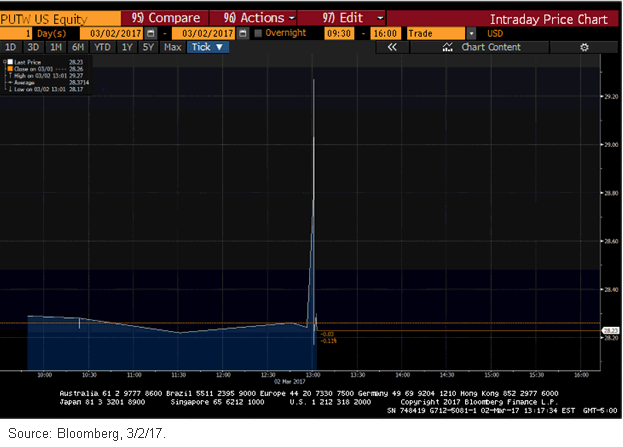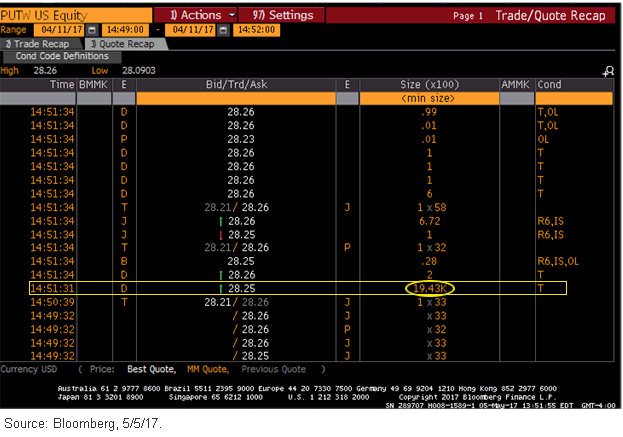ETF Execution: Your Choice Matters


This blog post is relevant to institutional investors interested in trading exchange-traded funds (ETFs) in significant volume. Individual investors do not always have access to liquidity providers to trade ETFs as referenced below.
The spectrum of sophistication among exchange-traded fund (ETFs) users ranges from new users of ETFs who are just learning and realizing their many benefits to those users who utilize ETFs on a daily basis and incorporate them into their portfolios. No matter where an investor is on this spectrum, what is paramount is to recognize that ETF execution affects your total return. Investors spend the majority of time on asset allocation, but when it comes time to execute, it is imperative to know what resources you have to obtain the best pricing possible.
Let’s take a look at two trades as the best way to understand the impact your execution choices can have on your bottom line.
Figure 1

Figure 1 shows an investor, Investor A, who wanted to buy 25,000 shares of the WisdomTree CBOE S&P 500 PutWrite Strategy Fund, PUTW. Investor A was unclear of what his resources were and did not feel like asking for assistance. He ended up entering a market order causing PUTW to spike 3.6%. PUTW is an investment vehicle—as opposed to a trading vehicle—so while there is ample liquidity available via the underlying securities, it is imperative to know how to access it and to not just enter a market order. PUTW’s underlying securities are S&P 500 Index put options, some of the most heavily traded options in the marketplace, as they derive their liquidity from the components of the S&P 500. This trade could have potentially been executed without any market impact.
So what could have been prevented? We always recommend that clients use a limit on all orders, instead of a market order, as a form of protection to ensure that their orders do not get filled outside a specific comfort zone. This is a clear example of how a limit is always encouraged, no matter the size of the order. The underlying securities of PUTW are extremely liquid, and had the investor made a simple phone call and used his resources, which will be discussed later, this could have been easily avoided. No size is ever too small to reach out to the capital markets team or your trading desk.
The second trade example, in figure 2, shows another investor, Investor B, who also wanted to purchase PUTW. On the opposite end of the spectrum, Investor B wanted to purchase 1,942,500 shares of the Fund, a MUCH larger chunk than Investor A.
Figure 2

As you can see, Investor B was able to purchase his entire order, which was almost 20 times the average daily volume, at one penny inside the offer in a single block. His execution was flawless. He was able to take advantage of the ETF structure by using his resources. The client reached out to the capital markets desk here at WisdomTree for a consultation on his trade and then was able to lean on his trading desk to implement his order. His trading desk was able to work with liquidity providers to tap into the underlying liquidity of PUTW. Investor B was not an expert trader, but he realized that he needed to utilize his resources to ensure a smooth execution experience. This trade example illustrates clearly that liquidity exists beyond what is on screen, and there are expert market makers who can access that resource and pass it back to the investor.
This brings me to the obvious question: Would you rather have the execution experience of Investor A or that of Investor B? I think we can all agree we would much prefer Investor B’s seamless execution experience. At WisdomTree we work with many investors and financial advisors on a daily basis, and we often see that investors spend the least amount of time on execution. What is essential to know is that an investor can potentially have a strong execution experience each and every time if they know how to use their resources. The WisdomTree Capital Markets Desk is always a resource in terms of ETF trading and education, and we are here to help facilitate all trades, both on the way in and on the way out. Furthermore, most investors also have a trading desk through their firm or custodian. One conversation can make a world of difference when implementing your investment vehicle of choice. No size is ever too small to reach out to your trading desk or the capital markets team. Remember, trading impacts your total return, and a simple phone call can ensure the impact is not negative.


